University
Murmansk Arctic University

MAU is one the northernmost universities in the world and the oldest university of Russian circumpolar area. We strive for being a university as diverse as the Arctic itself: our research, education, and other activities cover a wide spectrum of topics and ideas.
- Marine activities and navigation
- Psychology and pedagogy
- Engineering and construction
- Tourism, design, visual arts
- IT, mathematics, physics
- Humanities, social studies, economy, law
- Chemistry and biology
- Food industry
- Sports and life safety
- Medicine
- Energy – oil and gas, ore-mining and processing, nuclear power
All MAU programs are state certified and provide direct contact to major MAU industrial partners and stakeholders for students to know their future employers – PhosAgro, Novatek, Nornickel, EuroChem Group AG, Rosneft Oil Company, Rostelecom, Gazprom, Murmansk Commercial Seaport etc.
The university was created in 2023 after the merger of Murmansk Arctic State University (1939) and Murmansk State Technical University (1950).
Our advantages:
- Range of studies
- One of the most picturesque landscapes in Russia
- Combine work and studies
- Individual approach unlike in any other big university in Russia
- Engaging research, cultural and social events
- Flat-type dormitory
- Safe social environment
- Study Russian language by using it in real life
Rector
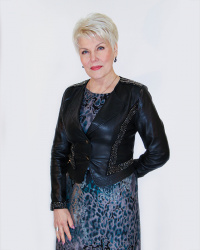
2019 — currently
Irina Shadrina (born 1960), Advanced Doctor in Pedagogy (2016), docent (2002) — graduated from Murmansk State Pedagogical Institute in 1981. In 1999, Irina Shadrina got her second higher education in psychology and management, and became a Ph.D. Since 1983, Irina has been working as assistant professor, senior lecturer, head of department, dean of faculty, first vice-rector and, currently, a rector, elected by the university staff. Irina Shadrina is an author of nearly 80 research papers and educational materials, as well as of 2 books on moral attitudes and ethics of teachers.
2010s — MSHU / MASU
In 2010, the university changed its name into Murmansk State Humanities University (MSHU). The new humanities specialization of the University gave an opportunity to launch new Bachelor and Master programmes in the fields of: physics and mathematics, natural and humanitarian sciences, social sciences, education and pedagogy, culture and arts, economics, management, and consumer service industry.
Centre of Professional Training Provision opened at the University in 2011 and aimed to give visually-challenged people and people with other types of special needs an opportunity to get higher education, improve the quality of their lives and create an accessible education environment at the University.
Being a leading regional humanities research institute, MSHU implemented research projects and held conferences within the framework of the Federal target programme and organized social research laboratories. Scientific-practical conferences «Ushakov’s Readings» and «Maslov’s Readings» became regular and well-known among the Russian scientists. «Public Lectures at MSHU» project was successfully carried out in 2013-2014 with the help of the regional government. Thirteen study programmes of MSHU became the winners of the all-Russian contest «The Best Study Programmes of Innovative Russia — 2013».
New units opened at MSHU:
- Innovative business centre
- Art industries centre «The Northern Lights»
- University computer studying laboratory
- Research and education centre for developing education techniques «Leader»
- Linguistic centre
- Innovative development department
In 2015 MSHU becomes Murmansk Arctic State University. In April 2017 the University received the status of a «Flagship University» of the Murmansk region. This status gave MASU an opportunity to establish new industrial partnerships, launch new programs, open innovative and creative bodies within the university, including new laboratories. MASU also acquired 2 new campuses with vocational and higher education in Apatity and Kirovsk, as well as a vocational college in Murmansk.
Rector
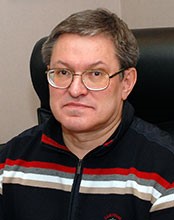
2009—2019
Andrey Sergeev (born 1962), Doctor of Philosophy (1998), Professor (2001) — was enrolled at Petrozavodsk State University (PetrSU) major in history and graduated with honours in 1984. In 1991 Andrey Sergeev finished his Ph.D. training, and in 1997 completed a Post-doc course at Saint-Petersburg University. From 1997 to 2006 Andrey Sergeev worked at PetrSU as an associate professor, professor and the head of the department. From 2006 to 2009 Andrey Sergeev had the position of a Vice rector for Research and strategic planning at Murmansk State Pedagogical University. In 2009 Andrey Sergeev was elected as rector of MSPU and then reelected in 2014.
2000s — MSPU
In 2002, the institute was turned into a university. By that time Murmansk State Pedagogical University (MSPU) had 30 department, 15 research laboratories, 22 Post-Docs and 128 Ph.D.-s working here. New study programmes were launched, including Bachelor and Master level ones, as required by Bologna Process. University status gave MSPU an opportunity to establish deeper cooperation with various foreign partners, including:
- University of Groningen (the Netherlands)
- NHL Stenden University of Applied Sciences (Leeuwarden, the Netherlands)
- University of Lapland (Rovaniemi, Finland)
- Lapland University of Applied Sciences (Rovaniemi, Finland)
- University of Tromsø (Norway)
- Finnmark University College (Alta, Norway)
- Narvik University College (Norway)
- Swedish Institute (Stockholm, Sweden)
- Luleå University of Technology (Sweden)
- Jacksonville University (USA)
- Goethe-Institute (Germany), etc.
MSPU opens The Interregional Centre for Special Needs Education — the first one in the North-West of Russia. Its aim was to design and introduce modern methods of teaching children with special needs.
In 2000s teachers of MSPU were largely engaged in R&D, creating books, manuals and articles, as well as taking part in scientific conferences, both national and international. Annual proceedings like «Ushakov’s Readings», «Maslov’s Readings», «Young Science of the Polar Region» and «Science Notes of MSPU» appeared at MSPU.
Local researchers have been engaged in scientific and pedagogical cooperation with the leading scientific centers and universities of Russia: Institute of World History of the Russian Academy of Sciences (RAS), Saint-Petersburg State University, Herzen University, Petrozavodsk State University, Northern Arctic Federal University, Kola Science Centre of RAS, Murmansk Marine Biological Institute, Polar Research Institute of Marine Fisheries and Oceanography, Zoological Institute RAS (Saint-Petersburg), Pasvik Nature Reserve, Polar-Alpine Botanical Garden-Institute, etc. MSPU scientists have been taking part in researches funded by Federal Target Programmes of the Russian Foundation for Basic Research, Russian Humanitarian scientific Foundation, Barents Secretariat, etc.
In October 2004 the branch of the All-Russian Student Rescue Corps was opened at the University — MSPU student volunteer rescue team regularly took part in rescue trainings as well as Russian and European rescue competitions. In 2000s «Olympia» sport club organized sport and health-promotion activities at the University. Many teachers and students of MSPU became prominent athletes, won the Russian and international contests (European Championship, World Cup, Olympics, the Festival of the North, etc).
The University offers great opportunities for students’ artistic expression: intellectual games, stand-ups, music band «Klyup», etc. Student theater of foreign drama «Nordika» (led by a Ph.D. in Pedagogy M. Kirilova) has been functioning for many years and staged several plays annually.
Rector
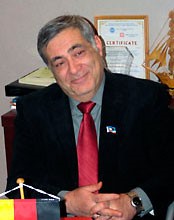
2000—2008
Ruvin Tripolsky (1945-2020), Doctor of Philosophy (1996), Professor (1997) — graduated from Ural State University in 1976. His research interests were methodology of science, philosophy of economics. Ruvin Tripolsky created more than 60 various scientific volumes, including monographs «Changes in the Economy: Study of the Theoretical and Worldview Trends», «Philosophy of Economics». Ruvin Tripolsky did a lot to turn Murmansk State Pedagogical Institute into a university.
1990s
In the early 1990s, MSPI opened the Museum of Kola Regional Education, initially organized at one of the Murmansk secondary schools in the 1960s by MSPI graduate V. Dranishnikov, Ph.D. in Pedagogy and a Professor of Pedagogy Department.
The number of students increased dramatically: from only 1500 people in the 1970s — up to around 6000 in the 1990s. At this period there were several new faculties and departments organized: Pre-school Education (1989), Education Management (1991), Foreign Languages (1994), Ecology and Natural sciences (1998), Art education (1999). All MSPI faculties offered major and refresher courses in 28 various specializations. The Institute launched Ph.D. programs, opened Pedagogy and Russian History Ph.D. accreditation councils, created a network of centers to offer supplementary training courses for locals. MSPI opened its editorial body (led by J. Aleksandrov) that was licensed to conduct printing and publishing activities. It started to issue periodicals «MSPI Barents-Centre Herald», «Science and Education», student newspaper «Planet of MSPI».
Since 1960s, MSPI students had been taking part in folklore, dialectological and archeological expeditions, but it was in 1997 that a first-year student Yury Ivanov and the staff of Revda Museum made an outstanding discovery — unique rock carvings (petroglyphs) around the Kanozero lake.
Rector
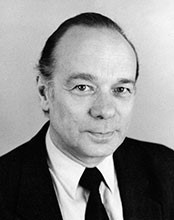
1977—2000
Eduard Lyavdansky (1936-2002), Ph.D. in Philology, professor of Literature Department. He graduated from Herzen University in 1963. In 1974-1977 he worked as a head of Leningrad Regional Institute of Teachers Improvement. His research interests were Ivan Bunin’s written woks, Russian literature of XX century, philology and regional studies. Eduard Lyavdansky created around 40 scientific volumes. As MSPI rector, Eduard Lyavdansky managed the construction of a new campus (16, Kapitana Egorova street) and a nine-storey dormitory, launched numerous new study programmes, opened new departments and faculties. Eduard Lyavdansky was conferred with the Badge of Excellence in National Education.
1980s
In the 1980s, MSPI began to improve its international cooperation activities. In 1988 it established relations with Lapland University (Rovaniemi), Groningen Politology Institute (the Netherlands), Luleo University (Sweden). The Institute launched exchange programmes for students and professors with the twin-cities of Murmansk — Luleo (Sweden), Rovaniemi (Finland), Jacksonville (USA). Within the framework of international cooperation, MSPI opened French Resource Centre, German Literature Centre, Barents-Club. The branch of Herzen University’s UNESCO Department was also created at the Institute.
In the late 1980s, the first educational television and computer classes appeared in MSPI, so the institute started to prepare IT teachers.
Another campus building (16, Kapitana Egorova street) was opened in 1987, followed by a nine-storey apartment dormitory a few years later.
Rector

1977—2000
Eduard Lyavdansky (1936-2002), Ph.D. in Philology, professor of Literature Department. He graduated from Herzen University in 1963. In 1974-1977 he worked as a head of Leningrad Regional Institute of Teachers Improvement. His research interests were Ivan Bunin’s written woks, Russian literature of XX century, philology and regional studies. Eduard Lyavdansky created around 40 scientific volumes. As MSPI rector, Eduard Lyavdansky managed the construction of a new campus (16, Kapitana Egorova street) and a nine-storey dormitory, launched numerous new study programmes, opened new departments and faculties. Eduard Lyavdansky was conferred with the Badge of Excellence in National Education.
1970s
In the 1970s, Professor V. Shejnker, Assistant Professors I. Merkuriev and L. Panteleeva laid the foundation of linguistic and philological regional studies at the Institute, and in 1973 the Institute launched its first foreign language program — «History and English language».
Rector
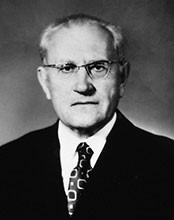
1962—1977
Nikolay Dmitriev (1916-1990) graduated from the Herzen University History Department in 1940. Nikolay Dmitriev held a Ph.D in History and dealt with the post-war history of the Murmansk region. Being a member of the regional and city administration, he took part in the organization of the Nordkalotten Days in Murmansk in 1966. He also headed the Social research group within the Murmansk regional Committee of the Communist Party and was a chairman of the Murmansk regional Committee on the Defense of Peace. As MSPI rector, Nikolay Dmitriev managed the construction of a dormitory (9, Kommuny street, now study campus) and organized the English teachers training at the Institute. Nikolay Dmitriev was conferred with the Order of the Badge of Honour, the Badge of Fighter for Peace and the Badge of Excellence in National Education.
1960s
In 1960s the Institute was largely engaged in R&D activities: Professors A. Kiselev and I. Ushakov created a great number of popular science books, textbooks and study guides on the history of the Kola region; A. Shnitman, the first MSPI Ph.D., took part in the creation of «History of Bulgaria» issued by Institute for Slavic Studies of the USSR Academy of Sciences; I. Demidov and B. Vejnts joined the expert group on developing the high school textbook «Algebra and the Basics of Analysis» later published in 11 editions; I. Luybinsky pioneered the new field in educational theory that considered theater as a way of intellectual and aesthetical development of school children; Professor L. Belyaeva conducted research within ethnical pedagogy; Professor A. Zimina became a recognized expert in the field of musical education.
In 1962, MSPI joined other Russian educational institutions in opening the Faculty of Social professions (thanks to the efforts of I. Lyubinsky and L. Panteleeva) aimed at providing students with an academic minor in the fields of culture and education. The Faculty was responsible for drama, rhetoric, choreography, vocal, choir, movie, athletic, art history, music, ballet, nursing, and other studies.
In the 1960s MSPI considerably improved its facilities and equipment. In 1961 it acquired a new four-storey campus, and in 1965 — a six-storey dormitory that later became a campus for one of the faculties.
In 1961, MSPI also opened a Student Research Society which included student design bureau, student theaters, scientific literature section, art assemblies, sport and tourism teams, orienteering, basketball, volleyball, ice-skating, skiing and fitness teams.
Rector

1962—1977
Nikolay Dmitriev (1916-1990) graduated from the Herzen University History Department in 1940. Nikolay Dmitriev held a Ph.D in History and dealt with the post-war history of the Murmansk region. Being a member of the regional and city administration, he took part in the organization of the Nordkalotten Days in Murmansk in 1966. He also headed the Social research group within the Murmansk regional Committee of the Communist Party and was a chairman of the Murmansk regional Committee on the Defense of Peace. As MSPI rector, Nikolay Dmitriev managed the construction of a dormitory (9, Kommuny street, now study campus) and organized the English teachers training at the Institute. Nikolay Dmitriev was conferred with the Order of the Badge of Honour, the Badge of Fighter for Peace and the Badge of Excellence in National Education.
1950s — MSPI
By the mid-1950s, the Institute had already prepared around 500 teachers. Some of the graduates became members of the local administration, headed regional and municipal education departments; regional culture administration, and local mass media (i.e. newspaper «Polyarnaya Pravda»), etc.
On February 7th 1956, the Council of Ministers ordered to reorganize the biennial Murmansk Teacher’s Institute into a Murmansk State Pedagogical Institute (MSPI) with five-years education. The departments of the Institute were turned into faculties.
In 1959 the Faculty of Preschool teacher training was organized. Only two groups of students had graduated from this faculty before it had to temporarily cease its functioning until 1978.
Rector
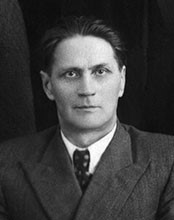
1956—1962
Mikhail Filippov (1897-1978) graduated from Leningrad Institute for Continuing Education in 1931. In 1929-1933 he worked as a teacher and the head of Staraya Russa Pedagogical College. Then he headed Murmansk Pedagogical College (1933 — 1944) and the regional department of national education (1940 — 1941). In 1951 he became the rector of Murmansk Teacher’s Institute and worked in this position till 1956.
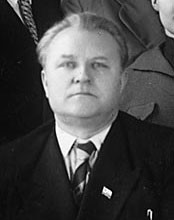
1951—1956
Sergey Smirnov (1905-1971) graduated from Herzen University in 1929. In 1952-1953 he chaired the MTI Department of Marksizm-Leninizm, and was a vice rector for research and education in 1954-1955. Sergey Smirnov worked to turn MTI into Murmansk State Pedagogical Institute and managed the construction of the History and Philology Department campus (15, Kapitana Egorova street). Sergey Smirnov held a Ph.D. in History and was the board member of «Norway — USSR» society. He was conferred with the Order of the Red Star and other medals.
1940s — MTI
Murmansk Teacher’s Institute (MTI) opened its doors on October 13th, 1939. Initially, it offered 2-year evening training for teachers, but latter organized full-time programs, intensive courses and part-time studies. At first, Institute had three departments to prepare teachers for the regional secondary schools: Physics and Mathematics, History and Philology, Chemistry and Biology (latter called the Department of Geography and Natural sciences). At that time there were only 75 students at MTI.
As the WWII broke out, the Institute ceased its activities and launched it again only in 1944. The Department of Geography and Natural sciences couldn’t restart its work for the lack of teachers and equipment: only five classrooms and 17 teachers remained in the Institute back then. There were only 87 students, whereas the study plan was designed for 125. To improve its educational and research efficiency, MTI invited experts from Moscow and Leningrad (now Saint-Petersburg), launched new specialized training programs, opened several departments of: Marxism-Leninism, Russian language and Literature, Pedagogy and Psychology, Mathematics, Physics, Military and Physical training. In post-war period, MTI started to train teachers of physical education, history, Russian language and literature, physics and mathematics. Later, MTI also launched courses in mechanical engineering, filming and photography held at technical laboratories and specialized classrooms. The Institute had vivid cultural and sports life supported by the administration and amazing teachers who worked in the Institute from 1939 to 1949: M. Izraelit, N. Kosyakov, S. Zakharov, V. Sigov, M. Filippov, I. Demidov, L. Fokeev, a. Sedina, A. Pogodina, V. Borisenko, G. Kletkina, V. Kostin, M. stepanova, Z. Shashkova, L. Zhiteneva, G. Petrova, I. Luybinsky. L. Tarasov, etc.
Rector
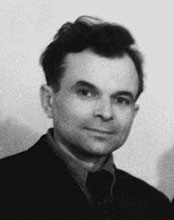
1945—1951
Vsevolod Sigov was born in 1908. He graduated from Voronezh State University in 1931. In 1936-1941, Vsevolod Sigov worked as a chemistry and biology teacher at local Voronezh Zoological College and headed several Secondary Schools there. Vsevolod Sigov was the member of Murmansk city committee of the USSR Communist Party. In 1951 Vsevolod Sigov became the head of Gorno-Altaisk State Teacher’s Institute.
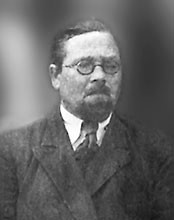
1944—1945
Semen Zakharov was born in 1897. He graduated from Kazan Pedagogical Institute in 1930, headed primary schools in Chuvashia, secondary schools and worker’s faculty in Moscow. Semen Zakharov also lectured at Plekhanov National Economy Institute and worked in the USSR consulate in China.
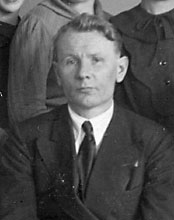
1940—1941
Nikolay Kosyakov (1905-1969) graduated from Herzen University in 1937 and headed Murmansk Teacher’s Institute from 1940 to 1941.
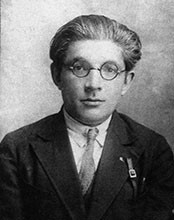
1939—1940
Mark Izraelit (1898-1943), was born in Riga, Latvia. In 1932, he graduated from Cherepovets Pedagogical College, but before that had been working as a math teacher in Dzhizak secondary school. In 1932-1936 he lectured at Cherepovets Pedagogical College, then, in 1936-1939 worked as a teacher and vice principal at Murmansk secondary school № 2. In 1939 Mark Izraelit became the first rector of Murmansk Teacher’s Institute. In 1940 Mark Izraelit was subjected to political repressions and died in a Gulag camp. Murmansk regional court rehabilitated him on January 25 1989.
